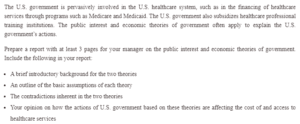The U.S Healthcare System
A brief introductory background for the two theories
“Public interest theory states that there are two simple objectives of the government, and they are market efficiency improvement, and redistributing income in a reasonable manner” (Feldstein, P.1.(2011) ch 3 p 53). The economic theory of regulation understands why there are health policies and reasons why they change over time.
Do you need an original copy of “The U.S Healthcare System” ? Reach out to us.
An outline of the basic assumptions of each theory
Many individuals have their biased assumptions of public interest theory based on concern. The efficiency goal of the government is to show that it can improve the allocation of resources. The government is supposed to provide reasonable help to the public. That means that they are required to provide affordable housing to low-income families. This also means that the government should provide cheap health insurance such as Medicaid and Medicare to eligible low-income families. In the eyes of the low-income community, they rely on the government, whether it is for utility assistance, housing assistance, healthcare assistance, or transportation assistance. The economic theory of regulation assumes that political markets are no different than financial markets.
What are the contradictions inherent in the two theories?
Firms that are in competitive markets typically seek regulation to earn profits that are higher and available in competitive markets. The prices in the regulated market have always been higher, which allows for higher better profits. Firms try to receive monopoly profits they are unable to exceed through market competition.
When one group has a concentrated interest in the outcome of legislation, the costs are diffused. The legislators will respond to the political support everyone is willing to pay to have favorable legislation enacted. When there are opposing groups, each with a concentrated interest in the outcome, legislators are likely to reach a compromise between the competing demanders of legislative benefits. Rather than balancing the gain in political support from one group against the loss from the other, legislators prefer to receive political support from both groups and impose diffuse costs on those unable to offer political support.
Your opinion on how the actions of the U.S. government based on these theories are affecting the cost of and access to healthcare services
The government’s actions are not affecting the cost or the access to healthcare services. Personally, the government has been steady and proficient in helping the community be able to afford affordable housing, food, and bill payments. Hospitals are understaffed but still can give individuals quality healthcare services no matter what their health insurance may be. Some individuals believe that no one should accept anything from the government, but that is solely their opinion.
References
Feldstein, P. J. (2011). Ch 3 p 53-57). Health Care Economics (7th Edition). Cengage Limited. https://aiu.vitalsource.com/books/9781285629414
ORDER A PLAGIARISM-FREE PAPER HERE
We’ll write everything from scratch
Question
The U.S. government is pervasively involved in the U.S. healthcare system, such as in the financing of healthcare services through programs such as Medicare and Medicaid. The U.S. government also subsidizes healthcare professional training institutions. The public interest and economic theories of government often apply to explain the U.S. government’s actions.

The U.S. Healthcare System
Prepare a report with at least three pages for your manager on the public interest and economic theories of government. Include the following in your notice:
- A brief introductory background for the two theories
- An outline of the basic assumptions of each theory
- The contradictions inherent in the two theories
- Your opinion on how the actions of the U.S. government based on these theories are affecting the cost of and access to healthcare services

